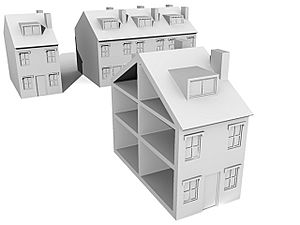Real property facts for kids
Have you ever heard the words "real estate" or "property"? These words are about something called real property. It's a fancy way of saying land and everything permanently attached to it. Think of it like this: if you own a piece of land, you also own the house on it, any trees growing there, and even things like wells or roads built on that land.
This idea of real property is very old and comes from a type of law called English common law. It helps people understand what they own and what they can buy or sell.
Contents
What is Real Property?
Real property is basically land and anything that is built on it or naturally grows on it. It's considered "immovable" because you can't just pick it up and move it somewhere else.
Examples of Real Property
When we talk about real property, we mean lots of different things. Here are some examples:
- Land itself: This is the most basic part.
- Buildings: Houses, schools, shops, and factories are all part of the real property if they are built on the land.
- Crops: If you have a farm, the crops growing in the fields are also considered part of the real property until they are harvested.
- Things built into the land: This includes things like wells, dams, ponds, canals, and even roads that are part of the property.
- Mines: If there's a mine on the land, the mine itself is also real property.
Real Property vs. Personal Property
It's important to know the difference between real property and personal property.
- Real property is land and things permanently attached to it. You can't easily move it.
- Personal property is everything else! This includes things you can move, like your bike, your phone, your clothes, or even furniture inside a house. If you sell a house, the house is real property, but the sofa inside is personal property.
How Real Property is Used
Real property is a big part of how our world works, especially when it comes to buying and selling land or homes.
Buying and Selling Real Property
When people want to buy or sell land or buildings, they usually work with estate agents. These agents help connect buyers and sellers in what's called the "real-estate market." Laws, like civil law, help make sure that these sales are fair and that everyone's ownership is clear.
Different Names for Real Property
The idea of real property is common around the world, but different countries might call it by different names:
- In Scotland, they call it "heritable property."
- In countries that use French-based law, it's often called immobilier, which also means "immovable property."
Understanding real property helps us understand how people own and use land and buildings, which are very important parts of our lives.
 | Percy Lavon Julian |
 | Katherine Johnson |
 | George Washington Carver |
 | Annie Easley |


